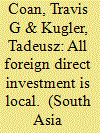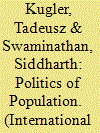| Srl | Item |
| 1 |
ID:
117802


|
|
|
|
|
| Publication |
2012.
|
| Summary/Abstract |
This study focuses on the differences between Indian states in terms of banking infrastructure, size of the economic market and most importantly provincial-level political capacity that creates the pull of foreign direct investment (FDI). While the majority of the extant empirical literature examines national-level data, few studies analyze international capital formation at the provincial level and the dynamics of sub-national political capacity-that is, where allocations are made and policies are implemented. This study corrects for this deficiency. Using data at the provincial level in India over the period 2000-2005, we find an inverted-U-shaped relationship between provincial capacity and FDI, suggesting the presence of a critical point at which additional extractive capabilities have negative implications for foreign capital accumulation. The results suggest a number of important policy implications, allowing researchers to identify specific regions in which capacity is likely to facilitate investment, while also providing a political-economic model to better-forecast changes in investment at the sub-national level in India.
|
|
|
|
|
|
|
|
|
|
|
|
|
|
|
|
| 2 |
ID:
119635


|
|
|
|
|
| Publication |
2013.
|
| Summary/Abstract |
Research on conflict traditionally focuses on its initiation, duration, and severity, but seldom on its consequences. Yet, demographic and economic recovery from the consequences of war lasts far longer and may be more devastating than the waging war. Our concern is with war losses and post-war recovery leading to convergence with pre-war performance. To test this proposition, we choose the most severe international and civil wars after 1920. We find that all belligerents recover or overtake demographic losses incurred in war. Economic assessments differ. The most-developed belligerents recover like a "phoenix" from immense destruction in one generation. For less-developed societies, the outcomes are mixed. The less-developed belligerents recover only a portion of their pre-war performance. The least-developed societies suffer the most and fall into lasting poverty traps. The overlapping generation growth model accounts for such differences in recovery rates based on pre-war performance challenging arguments from Solow's neoclassical growth perspective. Our results imply that foreign aid is incidental to the post-war convergence for the most-developed societies, can prompt recovery for the less-developed societies, and is not effective-unless it is massive and sustained-for the least-developed societies. World War II may provide a poor guide to current post-war challenges in Iraq and in Afghanistan.
|
|
|
|
|
|
|
|
|
|
|
|
|
|
|
|
| 3 |
ID:
076767


|
|
|
|
|
| Publication |
2006.
|
| Summary/Abstract |
This essay evaluates the implications of international political development on demographic transitions and economic outcomes from 1980 to 2050. Countries with high levels of political capacity experience the sharpest declines in birth and death rates as well as the greatest gains in income. Politics indirectly and directly affects the environment within which individuals make decisions about the size of families; these decisions, in turn, change the future economic dynamics of a country. We find that political capacity ensures that rules are evenly applied, allowing investment for long-term gain. Our projections show that under conditions of high political capacity, anticipated demographic and economic transformations will allow China to supersede the dominance of the United States by the end of this century and will also enable the rise of India into the ranks of the dominant powers. We assess the consequences of these changes in world politics
|
|
|
|
|
|
|
|
|
|
|
|
|
|
|
|